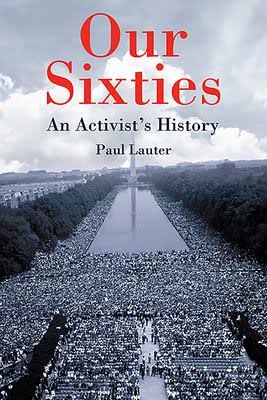Review of Our Sixties: An Activist’s History, By Paul Lauter (University of Rochester Press, Rochester, NY, 2020)
By Theresa Forsman

When we think of that iconic decade, the 1960s, we recall the assassinations of Martin Luther King Jr., Malcolm X, and John Kennedy, protests against the Vietnam War, the killing of student demonstrators at Kent State University. We think of four Black men refusing to leave a Woolworth’s lunch counter, riots in Detroit, Newark, Oakland, the Civil Rights Act, the fight for abortion rights, the founding of the National Organization for Women.
For people younger than 50, the Sixties are a story; for Baby Boomers who were adolescents back then, the Sixties were a fraught yet progressive time that they assumed would go on forever, the only world they knew. For many in the World War II generation, the burning of draft cards and flags was a frightening upending of the world they had known. For a relative handful of young adults who made the choice to be on the front lines of the anti-war, civil rights, and women’s movements, the 1960s was their passion and their work, paid or unpaid.
Paul Lauter was among that handful on the front lines. For those who ask what was accomplished in the Sixties and whether the gains from that time have eroded, Lauter has answers. When we wonder if our nation today, with Black Lives Matter, Me Too, and climate strikes, is built on the lessons of the Sixties, Lauter has answers. The work and, to a large extent, the life of Lauter, a retired literature professor of some distinction, was built on the firsthand, hard-won lessons he accrued in the Sixties.
In his new book, Our Sixties: An Activists’s History, Lauter details his participation, at times as a leader, in the organizations and activities that were part of the anti-war, civil rights, and women’s movements and how he continued that work when much of the demonstrating and protesting was over.
From academic to activist
Lauter’s transition from academic to activist began in 1963, when as a 30-year-old professor with a PhD in English he became director of peace studies at the American Friends Service Committee in Philadelphia. There, the “modest goal” was to figure out how studying peace and justice could reshape higher education.
On vacation from that job in the summer of 1964, Lauter got the lesson that most transformed his thinking. He participated in Mississippi Freedom Schools, where the Black children’s need to understand their own lives, their lived reality, led him to redefine the point of teaching and learning and to question the standard English literature reading list, the so-called canon, which at the time had no Black authors.
Lauter refers to his Freedom School insights, which “moved many of us far beyond our narrow educations at the Harvards and Yales,” throughout the book. What he learned that summer was the foundation for his Heath Anthology of American Literature, organized decades later, which transformed American literary study by including important works by ethnic minorities and women alongside the traditional white male authors with European roots. This was hardly an academic exercise. “How we study and what we learn express what and who our society sees as important, essential to know, and thus to respect,” he tells us. “The curriculum defines not just what matters but who ‘matters’ ”
Fighting the war and the draft
After his Mississippi Freedom School summer, Lauter takes his readers, chronologically and geographically, through the Sixties as they unfolded for him, first to Smith College, where he helped found and sustain the local chapter of Students for a Democratic Society; then to the Selma-Montgomery March for civil rights, where he was arrested while picketing at the Alabama State Capitol; to the American Friends Service Committee in Chicago, where he poured his energy into draft resistance for young men, including GIs. By 1967, Lauter was in Washington, DC, working on reforms for a Black, segregated school; then he went on to Baltimore, continuing his anti-war, anti-draft work. By 1969, this father of two young boys returned to the structure and steady paycheck of academia. Within a couple of years, while he was teaching at the University of Maryland in Baltimore, Lauter and longtime partner Florence Howe established The Feminist Press in an upstairs bedroom of their house. They published non-sexist children’s books, biographies of important but overlooked women, and important writing by women that was no longer in print.
Throughout his story, Lauter is frank about what worked, what didn’t, the times he was fired, the close calls in the South when he feared for his life. He tells of collaborators famous and obscure. He states his convictions and airs his doubts while working out what the Sixties meant for his life, what they meant—and mean—for the country. He reflects especially on the peace movement. “We made a difference and we have continued to do so as the movement (and the movements it helped spawn) continues the struggle for democracy, equality, and peace…Where we did not succeed was in translating a movement against that war in that time into a movement against all war in every time…But we taught ourselves, and many others, to stand up—often by sitting down. We’re still teaching, and thereby learning, the lessons of this movement.”
Yes, the questions the young teacher was asking in 1960s Mississippi about the meaning of democracy and who gets to be counted are being asked today. As the revolutions for racial justice, gender equality, income equality, and climate action gain momentum, Lauter has faith in the power of a dedicated, mobilized group of people to change what they can no longer tolerate. He offers his story as a baton to those who would carry it forward.
Theresa Forsman is a member of the Ethical Culture Society of Bergen County.
